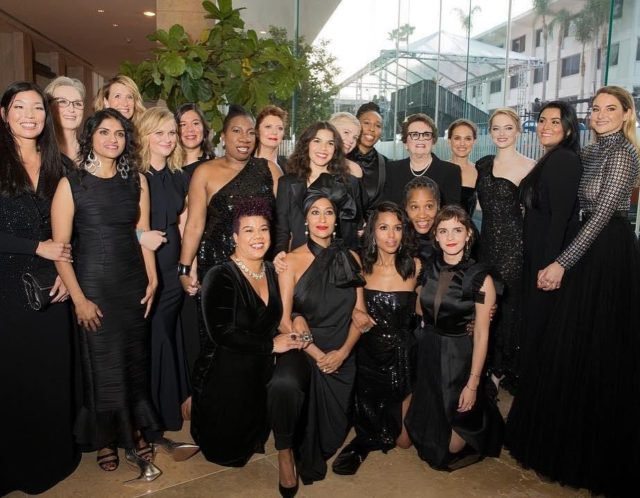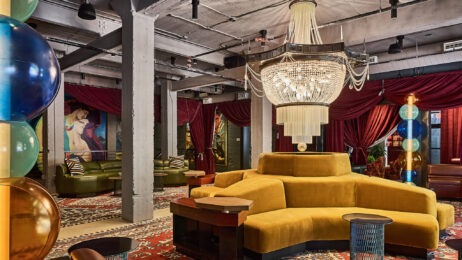The 75th Golden Globes, which took place on Sunday, was the first mainstream award show since the #MeToo movement, so it presented a critical moment in Hollywood. Fortunately, the industry prepared. On Jan. 1, #TimesUp was introduced. The hashtag urged Golden Globe attendees to wear black, signifying protest against widespread harassment and inequality among women in the workplace.
Globally, violence against women and girls affects 1 in 3 women in their lifetime. #TimesUp pic.twitter.com/55MnFKwKo3
— Emma Watson (@EmmaWatson) January 7, 2018
Aside from its declarative meaning, #TimesUp was inspired by the Time’s Up Legal Defense Fund, which subsidizes legal aid for those who have experienced sexual harassment or related retaliation in the workplace.
The #TimesUp movement isn’t exclusively for celebrities or the Golden Globes. It’s an ongoing effort that encourages everyone to tackle discrimination head-on. A lot happened at the show. And ultimately, the message of #TimesUp became the theme of the evening, spurring many to speculate, critique and applaud how it would play out. As a planner, here are the big takeaways for injecting some social justice into your next meeting or event.
1. Rethink Plus-Ones
Tarana Burke & Michelle Williams
at the 75th Annual Golden Globe Awards, Los Angeles | January 7, 2018. #GoldenGlobes pic.twitter.com/CMOVzYEZyK— Michelle Williams (@MichelleWFans) January 8, 2018
Stars brought activists into the spotlight. Actors chose figures that initiate and propel change as their plus-ones. Michelle Williams invited Tarana Burke, creator of the #MeToo movement. Many actors also brought activists and advocates for racial and gender justice. Pairs included Emma Stone and Billie Jean King, Emma Watson and Marai Larasi, Meryl Streep and Ai-jen Poo, Amy Poehler and Saru Jayaraman, and Lauren Dern and Monica Ramirez.
The potential here is boundless. Instead of limiting a plus-one to dates, planners might consider the impact that bringing together like-minded individuals could have. Without imposing pressure, planners can recommend bringing someone who inspires them, would like to participate or has had an impact. This may require a little more planning, so it’s best to set the RSVP deadline early.
2. Embrace an Open Dialogue
"And here are the ALL MALE nominees"
🙌 #NataliePortman throwing a little shade towards the #GoldenGlobes' Best Director category! pic.twitter.com/TDwtP4BQCA— Access Hollywood (@accesshollywood) January 8, 2018
During something as public as The Golden Globes, speaking freely and honestly can be difficult. Yet, women leading this effort used the platform as an opportunity rather than an obstacle. Natalie Portman aptly and boldly acknowledged that no female directors were nominated for best director this year, remarking, “And here are all the male nominees.” Meanwhile, Debra Messing addressed the fact that Catt Sadler’s left E! due to its refusal to pay her equally to male counterparts. These are only two instances during a night of abundant statements.
How can this approach be applied to events? At event, planners can refuse to beat around the bush. They can create a liberated environment where people are comfortable having an open and straightforward discussion. It’s important to use the correct language, point to real statistics and accounts, and refuse to diminish the current reality backing #TimesUp. You can also establish a panel system where attendees can take turns speaking or have the option of anonymously sharing. When the discussion involves attendees, be sure to implement a judgment-free policy.
3. Powerful Speakers are Key
It was the deepest honor to present @Oprah with the #CecilBDeMille award this #GoldenGlobes. It was an even bigger honor to hear these words in person. I’ve listened to this on repeat & her words & their meaning are more potent every time. I bid you to share! #MondayMuse #MeToo pic.twitter.com/YIIQnSQoWv
— Reese Witherspoon (@ReeseW) January 8, 2018
Most day-after conversations about the Golden Globes regarded the speakers. Laura Dern discussed how children are instructed not to “tattle,” but speaking up is empowering and necessary. Oprah Winfrey’s acceptance speech for the Cecil B. DeMille Award was rooted in black American history, along with an optimistic outlook for feminism. Many felt that the poignant rhetoric seemed suitable for a State of the Union speech. Accordingly, it was met with a standing ovation and speculation of a 2020 presidential run.
You may have some trouble booking Oprah for your event. However, hiring a speaker or awarding an individual who touches your audience is crucial. An influential speech will publicize your event, inspire attendees and guarantee a memorable experience. More importantly, it will promote involvement.
4. Urge Men to Meaningfully Participate
David Harbour having no idea what #TimesUp means is all dudes at the Golden Globes in a nutshell https://t.co/Ypr0frL3Ss pic.twitter.com/STn8pIUAua
— Jezebel (@Jezebel) January 8, 2018
Several men attendees arrived in all black. Many—including Jude Law, Chris Hemsworth, Aziz Ansari, Steve Carrell and James Franco—wore wore “Time’s Up” pins. Despite the gesture, the question of meaningful support remained. Many female actors spoke out, while men seldom mentioned #TimesUp in victory speeches, even though the topic dominated discussions throughout the evening.
The approach to coverage was also criticized by some. Reporters, such as E!’s Ryan Seacrest, appeared to question only women about these topics, while men were mainly asked about more commonplace topics relating to the awards.
Initiating real change isn’t possible with only half of the population on board. Men need to be considered, included and informed throughout the discussion and subsequent action. It’s important to urge men to attend and participate in a #TimesUp event. Their perspectives must be acknowledged, because inclusion is essential. Inequality affects everyone.
Be the First to Know
Everything meeting planners need in one beautiful print and digital magazine





